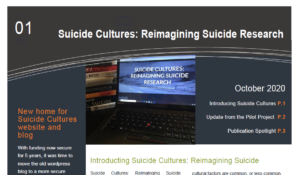In May 2023 I was delighted to be featured as the speaker for the ‘First Thursday Seminar Series’ organised by the Centre for Creative-Relational Inquiry, in the School of Health in Social Science, at the University of Edinburgh.
This was a wonderful opportunity to share some thoughts, ideas and ongoing analyses from the pilot work that I did – along with Sarah Wright – for the Suicide Cultures project. We ran a series of arts-based workshops – testing out approaches to working with different community groups to have conversations about suicide, its meanings, and its effects. The audience was a broad mix of counselling and psychotherapy practitioners and researchers, as well other scholars of suicide, and the discussion afterwards was a welcome chance to hear how others connected with the findings, and our analysis of these.
The paper I gave for the seminar drew on some eclectic theoretical resources – Lauren Berlant’s ‘slow death’ and Avery Gordon’s ‘haunted’ sociological imagination – to think through some of the stories that were told about living with and experiencing suicidal distress in our workshops.
You can listen to the seminar here.





